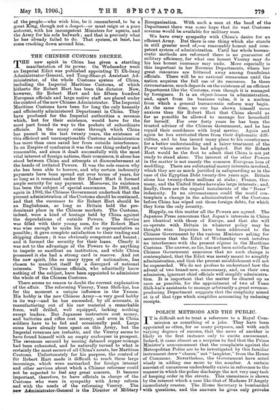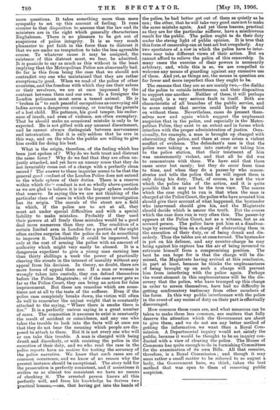POLICE METHODS AND THE PUBLIC.
IT is difficult not to treat a reference to a Royal Com- mission as something of a joke. They have been appointed so often, for so many purposes, and with such varying degrees of success, that the news of another is likely in the first instance only to excite amusement. Indeed, it came almost as a surprise to find that the Prime Minister's announcement that the complaints against the Metropolitan Police are to be investigated by this familiar instrument drew " cheers," not " laughter," from the House of Commons. Nevertheless, the Government have acted wisely in adding one more to the number. A certain amount of uneasiness undoubtedly exists in reference to the manner in which the police discharge the not very easy task of keeping order in the streets. This uneasiness is shown by the interest which a case like that of Madame D'Angely immediately creates. The Home Secretary is bombarded with questions, and the answers he gives only provoke more questions. It takes something more than mere sympathy to set up this amount of feeling. It runs counter to that disposition to assume that the law and its ministers are in the right which generally characterises Englishmen. There is no pleasure to be got out of suspicions of police integrity. It is so very much pleasanter to put faith in the force than to distrust it that we are under no temptation to take the less agreeable course. To whatever cause it may be assigned, the existence of this distrust must, we fear, be admitted. It is possible to say as much as this without in the least implying that the Metropolitan Police are abnormally bad. So far is this from being the case that we should not contradict any one who maintained that they are rather exceptionally good. When we read of the police of other countries, and the freedom with which they use their sabres or their revolvers, we are at once impressed by the contrast between them and our own. To a foreigner the London policeman must seem a tamed animal. He is " broken in " to such peaceful occupations as convoying old ladies across a dangerous crossing, or tracing the parents of a lost child. His patience, his good temper, his endur- ance of insult, and even of violence, are often exemplary. That he should make an occasional mistake is only to be expected. He is not gifted with any unusual discernment, and he cannot always distinguish between nervousness and intoxication. But it is only seldom that he errs in this way, and on the whole the public are willing to give him credit for doing his best.
What is the origin, therefore, of the feeling which has been just spoken of ? Why do we both trust and distrust the same force ? Why do we feel that they are often un- justly attacked, and yet have an uneasy sense that they do not invariably come out of a charge with a perfectly clean record ? The answer to these inquiries seems to be that the general good conduct of the London Police does not extend to the whole sphere of their duties. There is a reserve within which the'r conduct is not so wholly above question as we are glad to believe it is in the larger sphere outside that reserve. In saying this we are not thinking of the particular class of cases in which the present investigation has its origin. The morals of the street are a field in which, if the police are to act at all, they must act under special difficulties and with a special liability to make mistakes. Probably if they used their powers at all freely these mistakes would be a good deal more numerous than they are. The condition of a certain limited area in London for a portion of the night often excites surprise that the police do not do something to improve it. Undoubtedly it could be improved, but only at the cost of arming the police with an amount of authority which might very easily be abused. It is a dangerous expedient to give a young man earning less than thirty shillings a week the power of practically clearing the streets in the interest of morality without any appeal from his decision. In theory, no doubt, there are more forms of appeal than one. If a man or woman is wrongly taken into custody, they can defend themselves before the Police Magistrate ; or if the case never gets so far as the Police Court, they can bring an action for false imprisonment. But these are remedies which are some- times not at all to the taste of the sufferer. Even if the police case completely breaks down, the victim will often do well to remember the unjust weight that is constantly attached to the saying, " Where there is smoke there is fire." It is a perfectly untrue saying in a great number of cases. The connection it assumes to exist is constantly the result of accident or coincidence, and any one who takes the trouble to look into the facts will at once see that they do not bear the meaning which people are dis- posed to attach to them. But it is not every one who will or can take this trouble. A man is charged with being drunk and disorderly, or with resisting the police in the execution of their duty, and we who read the case in the police reports have no motive for testing the accuracy of the police narrative. We know that such cases are of common occurrence, and we know of no reason why the present instance should be exceptional. The story told for the prosecution is perfectly consistent, and if sometimes it strikes us as almost too consistent we have no means of checking it. The arrested person knows all this perfectly well, and from his knowledge he derives two practical lessons,—one, that having got into the hands of the police, he had better get out of them as quietly as he can ; the other, that he will take very good care not to make the same mistake again. And yet these lessons, practical as they are for the particular sufferer, have a mischievous result for the public. The police ought to do their duty under the strong light of public opinion. It is true that this form of censorship can at best act but irregularly. Any two spectators of a row in which the police have to inter- vene may take different views of their action. But we cannot afford to relieve the police of this censorship. In many cases the exercise of their powers is necessarily arbitrary, and, while this is so, we are compelled to welcome any means of guarding against any excessive use of them. And yet, as things are, the means in question are far fewer and more imperfect than they ought to be.
The reasons that they are so are mainly two,—the dislike of the police to outside interference, and their disposition to support one another. Neither of these, it will perhaps be urged, is a very serious fault in itself. Both are characteristic of all branches of the public service, and to some extent that service could hardly be carried on without them. Nevertheless, cases do present them- selves now and again which suggest the unpleasant suspicion that in the police, and especially in the Metro.- politan Police, they exist to an extent and in forms which interfere with the proper administration of justice. Occa- sionally, for example, a man is brought up charged with obstructing the police, and there at once arises a violent conflict of evidence. The defendant's case is that the police were taking a man into custody or taking him to the police station, that their treatment of him was unnecessarily violent, and that all he did was to remonstrate with them. We have said that these cases occur but rarely; but they do occur from time to time, and when they do a passer-by who remon- strates and tells the police that he will report them is only doing his duty. That, of course, is not the view which the police take of the action, and it is quite possible that it may not be the true view. The course which the case ought to run is that when the man is charged at the Police Court, the police who have arrested him should give their account of what happened, the bystander who intervened should give his, and the Magistrate should decide which is nearer the truth. But the course which the case does run is very often this. The passer-by appears at the Police Court, not as a witness, but as an accused person. The police have put him at a disadvan- tage by arresting him on a charge of obstructing them in the execution of their duty, or of being drunk and dis- orderly. Thus the tables are at once turned. The bystander is put on his defence, and any counter-charge he may bring against his captors has the air of being invented to extricate himself from a compromising position. The best he can hope for is that the charge will be dis- missed, the Magistrate having arrived at this conclusion, in part at least, because he thinks the unpleasantness of being brought up on such a charge will prevent him from interfering with the police again. Perhaps the worst element in this unpleasantness will be the dis- covery that the police, who have trumped up this charge in order to screen themselves, have had no difficulty in getting confirmatory testimony from other members of the force. In this way public interference with the police in the event of any excess of duty on their part is effectually discouraged.
How common these cases are, and what measures can be taken to make them less common, are matters that fully deserve the attention which the Government are about to give them, and we do not see any better method of getting the information we want than a Royal Com- mission. A Departmental inquiry would not satisfy the public, because it would be thought to be an inquiry con- ducted with a view of clearing the police. The House of Commons has quite enough to do in furnishing Committees for the examination of its own Bills. All that remains, therefore, is a Royal Commission ; and though it may seem rather a small matter to be referred to so august a body, the Government have, we think, taken the best method that was open to them of removing public suspicion.











































 Previous page
Previous page